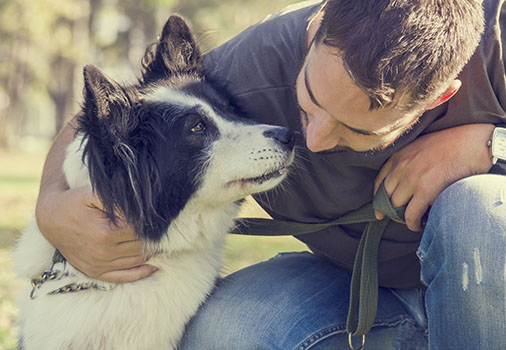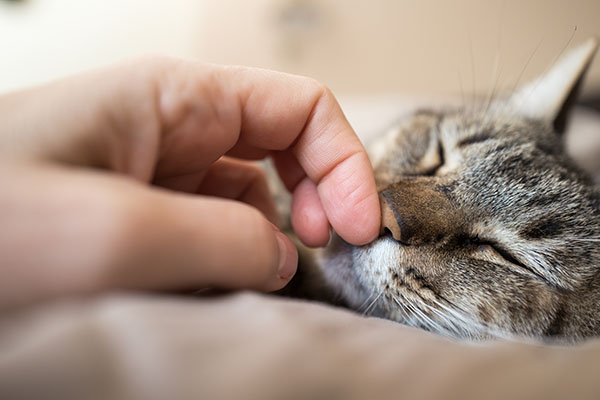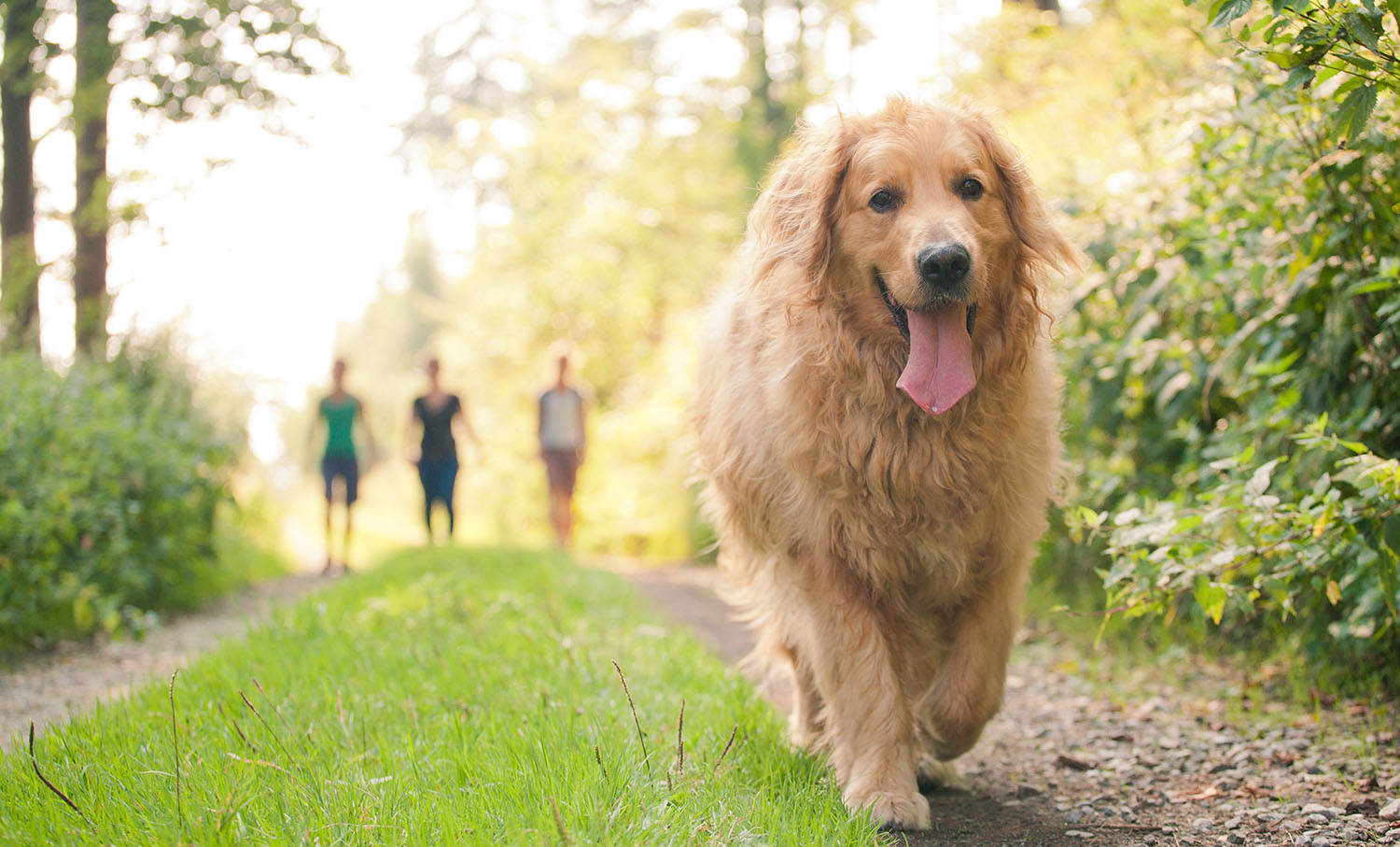Grieving the loss of a pet is an incredibly challenging journey that involves many complex emotions. We understand the enormous pain you’re feeling following the death of a beloved family member who left a lifelong imprint on your heart.
It’s normal to ask yourself questions like:
“How do I get over the loss of a pet?
“Where can I find support?”
“What should I expect in the grieving process?”
We are here to help you understand the deep-rooted emotions you’re facing and provide meaningful support, so you don’t have to walk the path of grief alone.

What is Grief?
Grief is an emotional response that typically follows the loss of a loved one. If you’re grieving a recently departed pet, you can expect to feel an intricate web of emotions, including sadness, overwhelm, shock, and more.
Your grief process is as unique as the close-knit bond you shared with your pet. There is not an exact equation on how to grieve or how long it will take to unravel all the complex feelings you’re facing. However, it’s helpful to understand the five common stages of grief, so you can recognize and embrace them if you experience them on your personal journey.
Denial
The first stage of grief often comes shortly after the loss of your pet. It brings forth questions like, “did this really just happen?” or “is my pet really gone?”
When you’re faced with life-changing devastation, denial is often a natural reaction that precedes other stages of the grief process. The feelings associated with denial range from numbness to total overwhelm.
Recognize that denial is a coping mechanism and be aware of denying thoughts that come to mind in your early grief stages.
Anger
Anger happens when you’re face-to-face with the pain of losing your loved one. This feeling of intense frustration or emotional rage may be directed at yourself, the loss of pet experience in general, or something entirely different.
This stage of grief often feels very intense and vulnerable. It’s a manifestation of pain into raw emotion as you process the traumatic experience you just faced.
Express your anger in a productive and healthy way, like writing down your feelings or talking about your feelings to a trusted friend or family member.
Bargaining
Bargaining is the internal dialogue that happens after loss, which involves lots of questions about decisions you made surrounding the event.
If you elected euthansia for your pet, you may be asking questions like:
“Did I make the right decision?”
“Did I choose to euthanize too soon?”
“Did I choose to euthanize too late?”
“Did I make a selfish decision?”
You can identify bargaining by recognizing “should have, could have, would have” language in your thought process.
Assure yourself that you made the right decisions and gave your pet a wonderful life, and don’t put too much pressure on yourself regarding the choices that you made.
Depression
Depression is a period of deep sadness that affects your day-to-day life. It’s common to feel heartbroken, tired, and generally sort of “blue.”
If you’re in the depression stage of grief, you’ll likely find yourself feeling distant or distracted from the aspects of life that usually bring you joy, or possibly spending more time crying and resting.
Many pet parents report depression as the most challenging and heavy part of the grief process, as it’s where you reach the depth of your pain and sorrow.
Work through your depression by focusing on giving yourself the time and resources you need to recover from this challenging chapter of your life.
Acceptance
Acceptance happens when you’re able to face the reality of saying “goodbye” to your pet and choose to pave a path forward in life.
Grief is not linear, and this stage doesn’t necessarily mean you’ve reached the end of the road in your journey. It’s normal to feel sadness about your loss for a very long time – possibly forever – or even relive some of the emotions you previously faced.
Acceptance means you have some sense of peace or hope in your healing journey.
How to Process the Loss of a Pet
Losing a pet is incredibly painful, and it’s a good idea to look for resources to help navigate the grief process and work through your challenging emotions. Here are actionable ways to grieve your pet:
Write about your pet.
Practice daily journaling and jot down what you’re feeling. Write a heartfelt letter to your departed pet or create a diary of some of your favorite memories together.
Speak with a professional.
Talk to a licensed veterinary social worker or a mental health care professional. Share your feelings and get one-on-one support to work through your unique grief experience.
Memorialize your pet.
Create a beautiful memorial stone in your garden, put together a scrapbook, plant a tree to symbolize new life, or establish a display inside your home to honor your pet.
Lean into family support.
Heal alongside your family who shared a love for your pet. If you’re a parent, create an open space for your kids to share their feelings, and consider buying age-appropriate pet loss books to help them cope.
Discover online tools.
Look online for blogs, video series, or other digital resources that address pet loss grief topics and give you an opportunity to further explore your complex emotions.
Give yourself time.
Don’t rush the grief process or put pressure on yourself to feel better right away. Practice positive self-talk and take the time you need to heal.
Pet Loss Support Groups
As you’re processing your pet’s loss, take comfort in support groups – online or in-person – so you can share your experience and emotions among other pet parents who can relate to your pain. Pet loss support groups are a great place to:
- Tell your story (if you’re comfortable sharing)
- Find educational resources
- Ask questions in community
- Learn how others are coping with loss
- Receive support you need to heal
Join our private Facebook support group led by Pet Hospice experts and immerse yourself in a community of support and guidance.
Honor Your Unique Journey
The human-animal bond is incredibly sacred. Pets are family, and the pain you’re feeling is absolutely comparable to the loss of a human loved one.
It’s so important to validate the grief you feel and acknowledge that the emotions you’re facing are very real and understandable.

Your departed pet was one of a kind, so it’s natural to expect that your healing journey will be unique, personal, and intimate. Allow yourself the time and space you need to grieve, and know that you’re not alone as you navigate your path forward.


